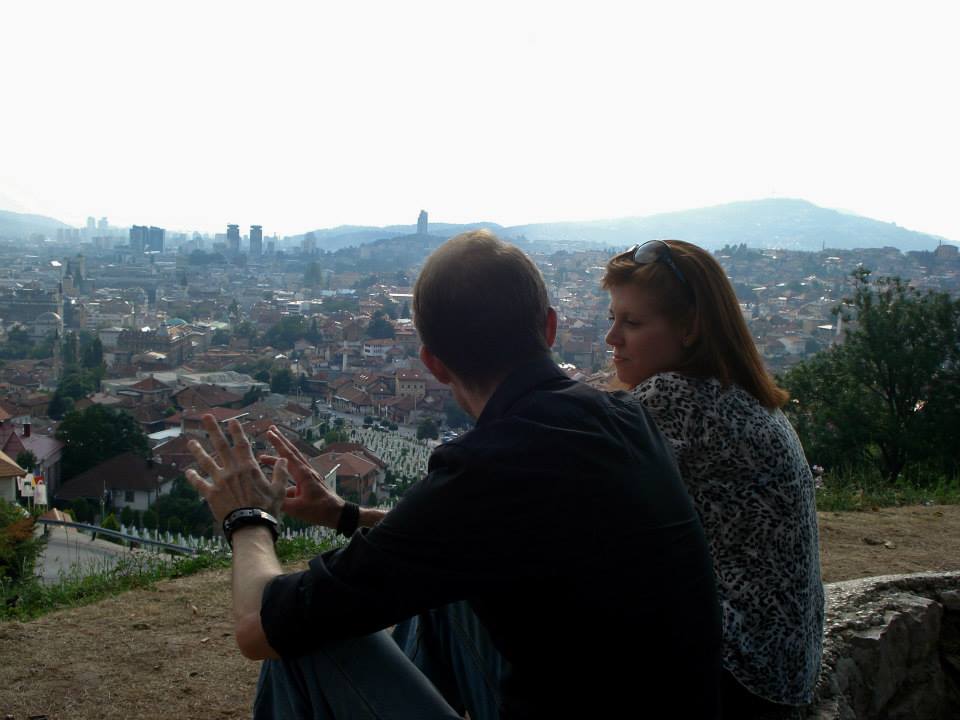WORKSHOP IN SARAJEVO: PROTECTING CIVILIANS IN WAR
_
Thursday, 27 April 2017, 10:00 am-430 pm | Meeting first at 10:00 am at Čajđžinica Đžirlo Tea House, Kovaći Walkway, Baščaršija, Sarajevo, Bosnia & Herzegovina. Then until 4:30 pm, we will train along a walking tour from Sarajevo’s old town to the former front line areas of Kovačići and Grbavica. This workshop is mobile, so please make sure you arrive on time at 10:00 am. Sign up as soon as possible at Humanitarianbazaar@gmail.com.
Our Workshop
__
Come learn with us! Participants are encouraged to attend free of charge if they trade a minimum of 10 hours of remote volunteer time for Humanitarian Bazaar’s War Survivors Advisory civilian protection project. We are developing it in Afghanistan, eastern Ukraine, and Iraq, with help from the people of Bosnia. Otherwise, the cost is 90 km/day for Bosnian citizens (our hosts) or 70 euro/day for internationals. Expert intensive trainees are 350 euro/day for our longer term course with long term advising and support for advanced trainees. All revenue will also go to the War Survivors Advisory civilian protection project. We will open with a briefing over coffee of how international humanitarian protection has evolved from the Bosnian War of 1992-5 to the current conflicts in Syria and Iraq 2012-2017. Then, we will go together along the former front line from Sarajevo’s old town, to the Skenderija bridges where the war began, up to the former front line areas of Kovacici and Grbavica discussing how civilian protection works in real conflicts.
_
Our Trainer
_
Daniel J Gerstle, founder of Humanitarian Bazaar and the War Survivors Advisory, has managed emergency response, refugee casework, and consulted on protection in Afghanistan, Bosnia, Chechnya, Iraq, Somalia, and recently in the war in eastern Ukraine. See video above.
10:00 am | Sarajevo Old Town
How Do International Agencies Try to Protect Civilians in War, 1992-2017?
__
- We will start with an overview of how international humanitarian agencies have transformed civilian protection from the time of the Bosnian War 1992-5 to the current day Syria & Iraq Wars in 2017.
- UN and international aid prioritizes protection of people who have escaped fighting, i.e. refugees and displaced families, especially the disabled and unaccompanied minors, but what about people who weren’t able to escape?
- Most civilian protection projects are social work–efforts to prevent gender-based violence, post-trauma psycho-social support, family casework, solving legal dilemmas for vulnerable families or unaccompanied children, as well as education about avoiding unexploded ordinance. But what about protection from artillery and other violence before people get hit?
- Seeing the changes in Sarajevo. We will start our tour from Sarajevo’s old town Sebilj Square along the river to the Skenderija Bridges where the war first hit the city, up to the Kovacici former front line, and then to Grbavica. Along the way, we will debate role plays. If you were a UN protection officer or rights advocate, how would you solve the no-win scenarios that happened here? And then we review how people actually did it and whether it worked.
_
_
11:30 am | Sarajevo Center
How Sarajevans Protected Themselves Before Aid Arrived
__
- Bosnian government in crisis, which parts of society could people rely on?
- Fire departments, hospitals, schools, youth groups, religious groups–How effective were local organizations before international aid could get in?
- What did families have to do only on their own?
- Benevolencija, an example of a local organization which was able to mobilize without being pulled to one side of the war.
_
_
13:00 pm | Skenderija to Kovacici
How did the UN and international agencies respond?
_
- As we see the Skenderija sites where the first shots were fired and the UN base was planted, we can review:
- What did the UN and aid agencies do that did work? To a small extent, late-coming food, medicine, fixing water systems, and so on. Large cement and metal barriers to protect people from shelling and gunfire. Plywood, tarp, and spare supplies.
- What did people have to solve themselves? Bomb sheltering, shielding, sniper blinds, foraging, finding wood, child care, elder care, disabled care.
_
_
15:00 pm | Grbavica
Question, Answer, & Practice
__
- If you were hired as a Protection Officer, how would you decide which urgent problems to solve first? How would you survey and communicate with the local front line communities? How would you get permission to cross the line? We review how it worked here on the Grbavica battlefield.
- Then, we role play, how would protection work differently in Donetsk, Ukraine; Aleppo, Syria; Mosul, Iraq; or Kunduz, Afghanistan; and why?
- Of course any questions and debate will be great!
_
_
Sign Up
_
Sign up for the course by writing us at humanitarianbazaar@gmail.com!

Trainer Daniel J Gerstle & Martina Orlandi in Sarajevo. Photo: HB.
